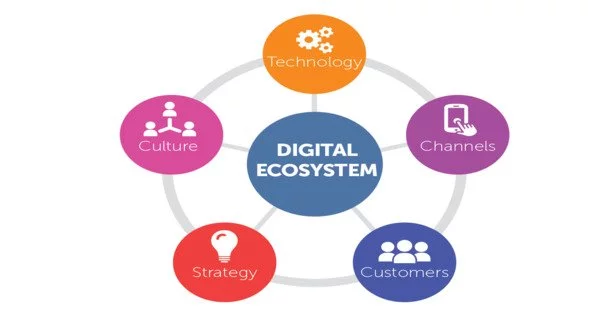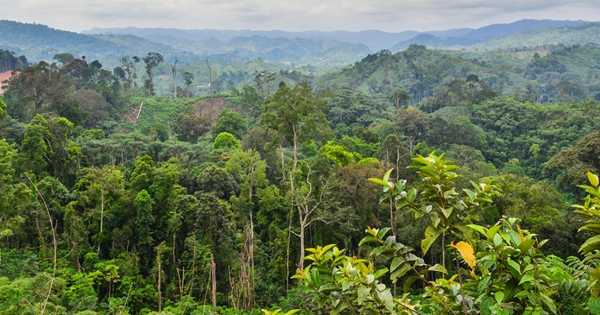A digital ecosystem is a networked, adaptable, open socio-technical system inspired by natural ecosystems in terms of self-organization, scalability, and sustainability. It refers to a complex, interconnected network of numerous things interacting in a digital environment, such as individuals, companies, devices, software applications, and data. These ecosystems are usually based around a shared aim, such as creating value, solving specific problems, or delivering services digitally.
Natural ecosystem information informs digital ecosystem models, particularly in terms of rivalry and collaboration among varied entities. The phrase is used in the computing and entertainment industries, as well as by the World Economic Forum. The concept of a digital ecosystem is closely related to the idea of a biological ecosystem, where different species and elements interact within a shared environment.
Key characteristics and components of a digital ecosystem include:
- Participants: It involves multiple participants, including users, businesses, developers, and other stakeholders. Each participant plays a unique role in the ecosystem.
- Platforms: These serve as the foundation for the digital ecosystem. Platforms can be physical (e.g., hardware devices) or virtual (e.g., software applications) and provide the infrastructure for interactions to occur.
- Data: Data is a crucial component of digital ecosystems. It is generated, collected, and shared among participants to enable various functionalities and services.
- Interconnectivity: Digital ecosystems thrive on connectivity. Various components, devices, and services are interconnected to facilitate data exchange and communication.
- Value Creation: The primary goal of a digital ecosystem is often value creation. This can be in the form of economic value, innovation, improved efficiency, or enhanced user experiences.
Examples of digital ecosystems include:
- Mobile Ecosystems: Companies like Apple and Google have created digital ecosystems centered around their mobile operating systems (iOS and Android). Users can access a wide range of apps, services, and content through these platforms.
- E-commerce Ecosystems: Amazon is a prime example of an e-commerce ecosystem, where buyers, sellers, advertisers, and logistics services are interconnected to facilitate online shopping.
- Cloud Computing Ecosystems: Cloud providers like Amazon Web Services (AWS), Microsoft Azure, and Google Cloud offer a range of services and tools that form the basis of digital ecosystems for businesses and developers.
- IoT (Internet of Things) Ecosystems: In IoT ecosystems, various connected devices, sensors, and software applications work together to collect data and automate processes in areas such as smart homes, smart cities, and industrial applications.
Applications
Within the ecosystem, software applications and services are built to deliver specialized functionalities or solutions to individuals and businesses. Mobile apps and cloud-based software are examples of these applications.
The concept of digital ecosystems is critical to the digital transformation of businesses and society because it promotes cooperation, creativity, and the effective use of digital resources to produce value and solve complicated challenges. However, it poses questions about data privacy, security, and competitiveness, as powerful actors in an ecosystem may wield tremendous power and influence.
















